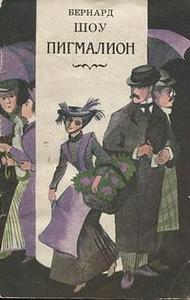Take a photo of a barcode or cover
Well this was super fun, and I enjoyed looking it up afterwards and seeing the changes that were made over time. And now I want to watch My Fair Lady again.
funny
lighthearted
reflective
fast-paced
Plot or Character Driven:
Character
Strong character development:
Yes
Loveable characters:
Yes
Diverse cast of characters:
No
Flaws of characters a main focus:
Yes
I have never seen "My Fair Lady" but if you've seen any movie where they take a downtrodden individual and dress them up for prom, you get the idea.
I was pleasantly surprised! There was a lot more here than I thought there would be. Mostly I'm glad Eliza stood up for herself and wasn't going to be treated like a servant fetching slippers or a plaything. She was way more accomplished than anyone gave her credit for.
I listened to this on Librivox and all the cast did a great job. My favorite parts were the overly broad accents and the "OOOOOH!" exclamations. If anyone heard me listening to it, I'm sure they thought I was nuts :D
Also: Mr. Doolittle randomly got a lifetime of money/job because Higgins made fun of him? Didn't really get that part but that's o.k.
The wrap-up tying this to Pygmalion and Galatea made a lot of sense in terms of illustrating Eliza's choices.
Classic, timeless literature for sure!
I was pleasantly surprised! There was a lot more here than I thought there would be. Mostly I'm glad Eliza stood up for herself and wasn't going to be treated like a servant fetching slippers or a plaything. She was way more accomplished than anyone gave her credit for.
I listened to this on Librivox and all the cast did a great job. My favorite parts were the overly broad accents and the "OOOOOH!" exclamations. If anyone heard me listening to it, I'm sure they thought I was nuts :D
Also: Mr. Doolittle randomly got a lifetime of money/job because Higgins made fun of him? Didn't really get that part but that's o.k.
The wrap-up tying this to Pygmalion and Galatea made a lot of sense in terms of illustrating Eliza's choices.
Classic, timeless literature for sure!
Story: 6.5 / 10
Characters: 7.0
Setting: 7.0
Prose: 7.0
Tags: Class, language, character, science, goals, responsibility
Characters: 7.0
Setting: 7.0
Prose: 7.0
Tags: Class, language, character, science, goals, responsibility
I've heard about the play but never read it or seen an adaptation of it before but when I have heard about it, it was talked about highly. This didn't disappoint at all, was a very pleasant read and easier to read then I thought. I'm rating this a 3.5 out of enjoying reading it but I would love to see some adaptation of this and maybe I'll like it more then.
funny
lighthearted
reflective
fast-paced
Plot or Character Driven:
Character
Strong character development:
Yes
Loveable characters:
Yes
Diverse cast of characters:
Yes
Flaws of characters a main focus:
Yes
Ok wow. I knew I would like this a lot but I didn't think I would love it as much as I did. I completely devoured this one, which is saying something because I normally take eons to finish a book. I love a when a text is so rich in its thematic elements, while still remaining so accessible to its readers, and this is definitely one that does that. Also it was genuinely SO funny. I think the last act really sealed the deal for me - containing heaps of thoughtful commentary on social class + femininity roles while being balanced with very witty moments. A particular highlight was Pickering and Liza roasting the living daylights out of Higgins in front of him and his own mother. Also Higgins talking about how well-educate, successful, and capable he is when he literally needs someone to manage his own schedule and get his slippers for him. An easy 5/5 for me.
Meh. My enjoyment of the first act was maybe 4 stars. Second act: 3 stars (I actually found the bickering more annoying and circular than entertaining.) Third act, if you can call it that: 1 star. Average that out, 2.67777 stars.
I wasn’t upset that Eliza didn’t marry Higgins (I liked Freddy, and Higgins is beastly.) I’ll just never understand why the third act was just a narrator telling what happened? Doesn’t that defeat the purpose of a play? Also, did he have to be so dang condescending? I felt like I was just listening to someone who loved to hear himself talk.
If you’re looking for a witty and lighthearted play that will make you lol, I’d recommend the Importance of Being Earnest. Tho I seem to be in the minority with Pygmalion, so you might as well give them both a try!
I wasn’t upset that Eliza didn’t marry Higgins (I liked Freddy, and Higgins is beastly.) I’ll just never understand why the third act was just a narrator telling what happened? Doesn’t that defeat the purpose of a play? Also, did he have to be so dang condescending? I felt like I was just listening to someone who loved to hear himself talk.
If you’re looking for a witty and lighthearted play that will make you lol, I’d recommend the Importance of Being Earnest. Tho I seem to be in the minority with Pygmalion, so you might as well give them both a try!
Summary:
George Bernard Shaw’s Pygmalion is an hilarious exploration of the impact of language and dialect in relation to social acceptance and class. The main characters, experts in phonetics, make a bet that they can pass off a simple, classless flower seller as a lady of high society at an elaborate dinner party. Of course, what is unanticipated is the tangled web of emotions which get involved. Shaw’s “battle of the sexes” is another layer, equally pleasing, of the story which centers on class, language, and “appearances.”
The Good:
The story itself is absolutely hilarious – it reminded me somewhat of Oscar Wilde’s The Importance of Being Ernest, in that each character seemed to be, in one way or another, just downright silly. What these characters place importance in, how they interact with one another (the flower seller throwing slippers at her teacher, and his being “turned on” by it, for instance), and that the expected “happy ending” turns out a bit differently from what would be assumed all make this play entertaining and fun, while also staying true to its didactic purpose (the importance of taking language seriously). In fact, that Shaw takes his subject matter so seriously, but presents it in such a playful way, almost – surprisingly- seems to work to the overall impact and advantage of Shaw’s purpose. In a way, the irony of Pygmalion’s brilliance is that it seems so ridiculous and good-natured but, by its very humorousness, the reality of male-female relations, class disparities, and language barriers are all brought to light. It works almost subsurface, similarly to much of Shakespeare’s work – which was so cleverly disguised with wit, but which in reality had much to say about life, politics, religion, etc.
The Bad:
The ending seemed a bit abrupt and, while the somewhat surprising nature of the happy conclusion works to the play’s advantage, it is also a bit disconcerting. That our flower girl winds up finding true love is great, but that it happened so suddenly and without much explanation, and that the two gentlemen who initially used her simply for research purposes and as a means to an end (“the gamble”) should then end up being her benefactors, is just a bit far-fetched. Still, this is about all that can be said against the story as a whole – as its purpose as a study of phonetics is well done, and the story itself is amusing and interesting.
Final Verdict: 4.5 out of 5.0
funny
lighthearted
fast-paced
Plot or Character Driven:
Character
Strong character development:
Yes
Loveable characters:
Yes
Diverse cast of characters:
No
Flaws of characters a main focus:
Yes
about the power of language and phonetics when attempting to climb the social ladder: after all, life is only but a play
this book has the merit, not only of being genuinely funny, but most importantly of never romanticizing Eliza and Higgins’ relationship, that is to say Galatea and Pygmalion’s one. the inequity of their social positions and the imbalance of power between them are well shown and Eliza, in the end, makes the right choice by not falling for the “disrespectful and lowkey abusive man who hides his softness behind sarcasm” trope. i also loved the role given to phonetics over culture or money: here, Shaw merely shows us that elitism and aristocracy are marked by a certain form of speech which values itself as the “higher” and “correct” (and lowkey archaic) English.
this book has the merit, not only of being genuinely funny, but most importantly of never romanticizing Eliza and Higgins’ relationship, that is to say Galatea and Pygmalion’s one. the inequity of their social positions and the imbalance of power between them are well shown and Eliza, in the end, makes the right choice by not falling for the “disrespectful and lowkey abusive man who hides his softness behind sarcasm” trope. i also loved the role given to phonetics over culture or money: here, Shaw merely shows us that elitism and aristocracy are marked by a certain form of speech which values itself as the “higher” and “correct” (and lowkey archaic) English.






